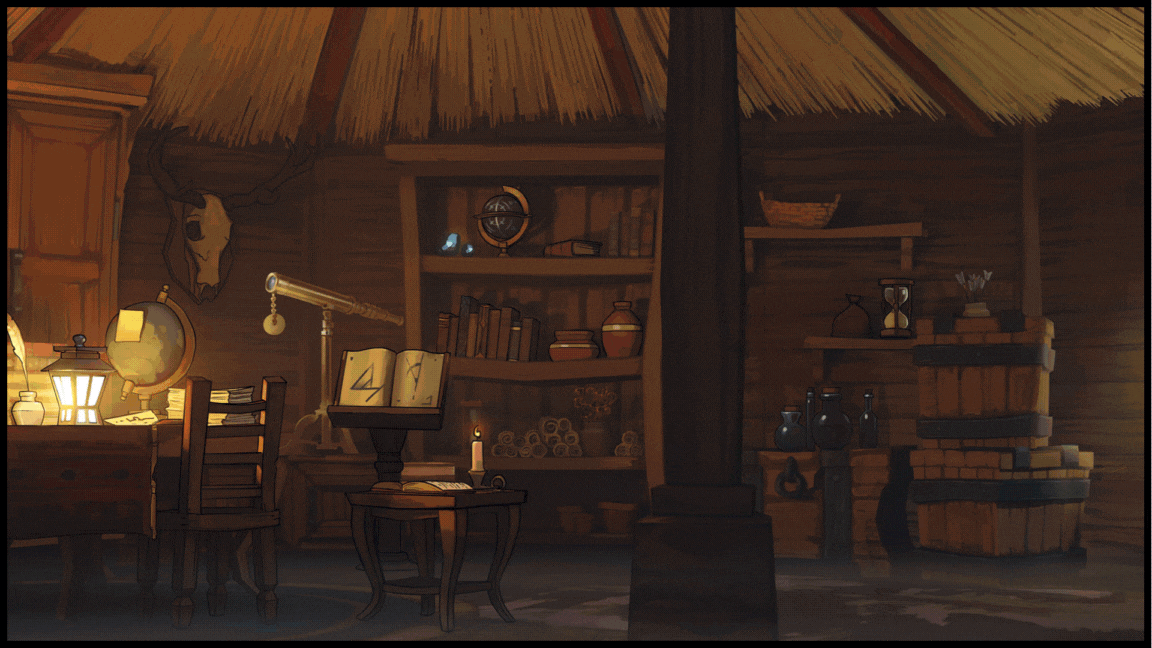

Hello there, Splinterlands community! 👋
I'm back with part three of my Splinterlands Social Media Challenge series, diving deeper into the new Rebellion Reward Cards! Last week, we covered the Epic Reward Cards, and the previous week, the Legendary Reward Cards. This time, I’ll be focusing on Common cards, analyzing each card's strengths and weaknesses to see how they fit in the current meta, especially in Modern format. ⚔️💥


In this series, I aim to provide an in-depth look at these new reward cards by rarity, guiding players toward better decisions when expanding their collections or exploring the Glint Shop 🛒✨.
My insights focus on higher-level gameplay, where I spend the bulk of my time, though I'll also cover how these cards might perform in Bronze and Silver 🥉🥈. While not all my Common cards are fully maxed, most are close, with all reaching at least gold level—enough experience, I believe, to provide a balanced assessment.
With that, let’s dive in and explore the Common cards in Rebellion! 🔍🔥

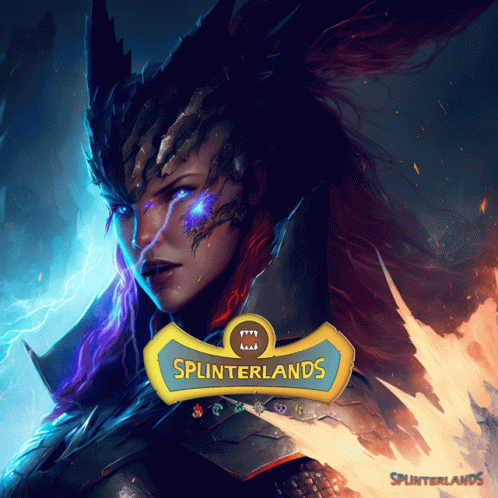
Evaluating the Essentials: Common Cards in the Rebellion Reward Set 🌟🌟
So far, we’ve analyzed and discussed the Rebellion Reward Set, noting the disappointment with the Legendary cards and the strength and intrigue of the Epic cards. Some of the Epic cards proved to be essential, offering a definitive advantage in gameplay.
Now it’s time to focus on the Common cards. The team released twelve Commons in the Rebellion Reward set, and as a hint, we can already confirm that a few are truly underwhelming, some are excellent, and others fall somewhere in between. It appears the team has struck a better balance in terms of power with these cards. 🏆🔥
An interesting point about Common cards is that they’re likely the first ones players will fully max out and incorporate into daily use. Although I haven’t maxed any yet while playing at top levels (Diamond I & Champion III), I’m getting close and should be there within a few more seasons. I've already come across players who have maxed them out, as I’ve encountered these cards maxed in ranked matches.
With twelve cards to review, let’s jump right in and evaluate each one to answer these questions. As before, I’ll be rating each card on a 1-10 scale. 🎯📊

Common Card Analysis for Splinterlands Rebellion Reward Cards
Drybone Hobgoblin: Rating: 5/10 ⚔️
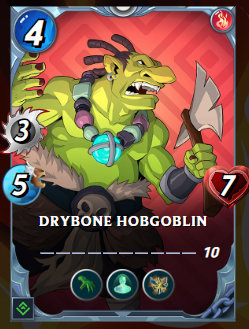
Hobgoblin is a tricky card to rate. First, it comes with the Immunity ability, which is always useful, especially for Poison rulesets. Any card with Immunity finds its niche in Poison battles sooner or later!
Its stats are decent, though not outstanding: 7 health, 5 speed, and 3 damage for 4 mana. This makes it a decent, but not spectacular, option. However, as a Fire Splinter card, Hobgoblin faces limited opportunities to truly shine since Fire’s usual strategies don’t typically favor it.
Another drawback is its lack of armor, leaving it vulnerable to heavy hits. In Little League rulesets, it’s playable, though unlikely to turn the tide of a match; still, it’s a handy option to keep in mind.
Overall, Hobgoblin is solid on paper but isn’t well-supported by the current meta, so it may not see much use for now. However, it’s worth keeping around, as this could change once Chaos Legion rotates out of Modern. Long-term, this one’s a keeper. 🔒✨
Chaos Evoker: Rating: 2/10
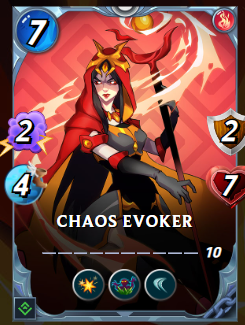
The role of Chaos Evoker in a matchup is somewhat unclear. While it has Blast and Ambush, which are typically strong abilities, it only delivers 2 magic damage at a cost of 7 mana. Realistically, even with Blast, this card’s damage output is minimal, as 2 damage isn’t enough to make a significant impact. Considering that opponents will likely have Silence or Void on their team, Chaos Evoker may end up dealing just 1 or 0 damage.
The rest of its stats are also underwhelming: 7 mana for 7 health, 2 armor, and 4 speed doesn’t offer much value. Personally, I can only see using this card in an all-magic ruleset where I’m forced to play Fire and need a bit of extra durability up front. This card is really missing some sort of debuff to the enemy like Silence or Weaken.
Giant Alpine Skink: Rating: 5/10
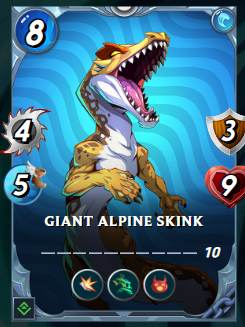
Giant Alpine Skink is primarily a tank for the Water Splinter, equipped with Shield, Phase, and 5 speed. This combination is decent, especially since it’s tricky to land magic attacks on a card with such high speed. Its defensive stats are solid too, with 3 armor and 9 health, and the Taunt ability adds extra value.
However, the card still feels like it’s missing something. The main issue is the availability of stronger alternatives; cards like Baakjira, Oshanus, and Diemonshark offer more reliable options at similar mana costs. While Giant Alpine Skink isn’t bad on paper, it’s often outclassed by these alternatives. This makes it situationally useful—primarily in matches with restrictive rulesets where any viable option is valuable.
Mar Toren Trader: Rating: 8/10
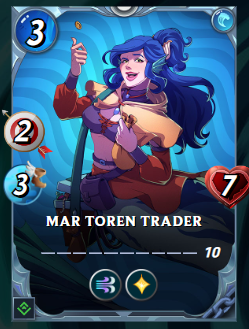
Mar Toren Trader earns a high score because it's one of the few low-mana cards with Headwinds. While niche, this ability makes it essential in certain situations, especially as a debuffer against ranged attackers. We’ll likely see this card in nearly every Water Splinter lineup for ranged-only matchups.
Although its attack stats aren’t impressive, that’s acceptable for a 3-mana card with a debuffing role. We’re mainly looking for it to survive, and its 7 health makes it durable enough. Additionally, the Heal ability adds extra resilience, making it effective in Poison rulesets or simply keeping it alive longer. While it would be even better with Triage, similar to Angelic Mandarin, it’s already a decent card as it is.
Halaran Huntress: Rating: 5/10
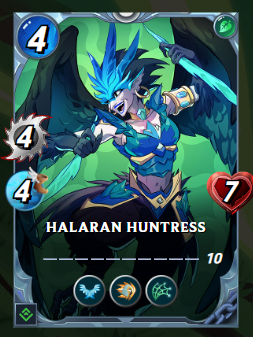
Halaran Huntress comes with a solid stat line: 4 attack, 4 speed, and 4 health, along with Charge, allowing her to attack from the backline—a strong combination. At 4 mana, she’s also likely to see frequent use in Little League rulesets.
The downside, however, is that she doesn’t quite fit into the current meta. If she had been released a year ago, Huntress would have been highly effective, but with the prevalence of cards like Tofu, she now struggles to hold her ground. In most matches, she’ll likely get in about 3 attacks before being taken out.
That said, the meta could shift, and by itself, Huntress is still a solid card.
Blackmoor Wild Elf: Rating: 2/10
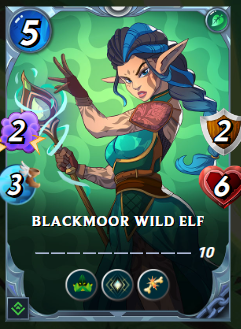
Blackmoor Wild Elf is another card with relatively high mana (5) and low attack (2 magic). Similar to Chaos Evoker, this card struggles to do significant damage, as opponents will likely counter with Silence or Void. It has Camouflage, Amplify, and Cripple, though Camouflage and Cripple are usually of limited use. The only real benefit this card offers is Amplify, making it an option if you need Amplify and have exactly 5 mana left to spend.
Aside from that, this card doesn’t offer much. Its speed, attack, health, and armor are all low, and it lacks impactful abilities, making it fairly underwhelming.
Nimbledook Explorer: Rating: 9/10
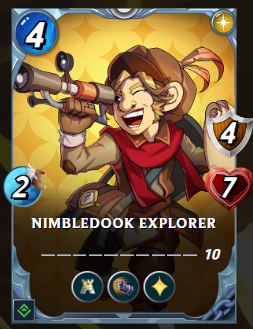
Nimbledook Explorer is arguably the best Common card in the Rebellion Reward Card set. For just 4 mana (making it viable in Little League), it offers Protect, Armored Strike, and Heal. Honestly, Protect alone justifies the 4-mana cost, as it’s such a valuable ability on a low-mana card.
Interestingly, its lack of attack works in its favor, allowing it to pair perfectly with Weapons Training. This means that, for very little mana, you could add up to 3 magic attack to this card, making it highly versatile.
One common issue with similar cards is Magic Reflect on the opposing team, but this card counters that with Heal, enabling it to recover some of the reflected damage it takes. On top of this synergistic set of abilities, Armored Strike is a nice bonus, helping Nimbledook deal some damage either from the front or backline. While not game-breaking, it’s a fantastic addition to an already amazing kit.
Luceheim Demon: Rating: 4/10
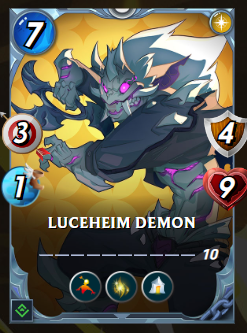
Luceheim Demon initially seems underwhelming, with its 7-mana cost, 3 ranged damage, and 1 speed. This means it often won’t deliver significant damage, even in reverse-speed rulesets, where 3 damage for 7 mana is still low. For comparison, cards like Goblin Tower bring 5 damage with Blast and similar speed at a lower cost.
However, Luceheim Demon’s strengths lie in its defensive stats and utility abilities. With 9 health and 4 armor, it has decent survivability. The card's abilities—Snipe, Cleanse, and Triage—are particularly valuable, especially in Life Splinter matches where Tofu is prevalent. With Triage on both Luceheim and Tofu, your backline can be quite durable.
Overall, while this card requires very specific conditions to be effective and may not see frequent use, it does have situational value.
Broken Earth Thug 6/10
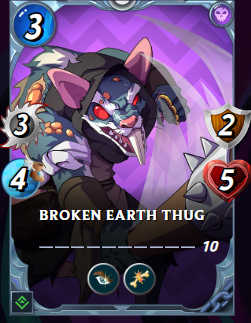
Broken Earth Thug is a simple yet solid card. For 3 mana, it brings 3 melee attack, some armor, 5 health, and 4 speed for the Death Splinter, making it quite decent stat-wise.
Its abilities aren’t extraordinary, but Opportunity is always helpful, and it can synergize well with other cards. This card will see a lot of use as a dependable filler when you have an extra 3 mana left. While it’s not a card to build a strategy around, it’s definitely one of the better options for its cost.
Ujurak Brave: Rating: 3/10
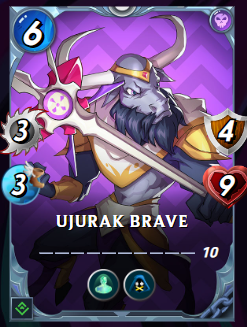
Ujurak Brave is another card with Immunity, which is usually useful, but it’s less impactful here. For 6 mana, it offers 3 melee attack, which is underwhelming offensively, though its 9 health and 4 armor do make it reasonably tanky.
The card’s main drawback is its lack of defensive abilities beyond Immunity, meaning it doesn’t hold up as a primary tank in standard rulesets. Additionally, it lacks effective offensive abilities, as its melee attack can’t be used from the backline.
Its Silence ability also feels situational and doesn’t add much unless you're stacking Silence effects. Overall, while Immunity is useful, it doesn’t provide enough value on its own for this card.
Tokatag Conscript: Rating: 1/10
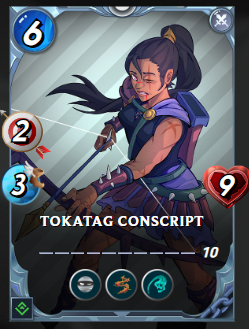
Tokatag Conscript is a 6-mana card with just 2 ranged attack, 9 health, 3 speed, and no armor. Its abilities—Thorns, Sneak, and Backfire—feel mismatched.
Firstly, a card with Backfire at low speed is ineffective, as Backfire relies on the opponent missing attacks, which isn’t likely without major team buffs or debuffs, which can be costly. Secondly, as a ranged Sneak attacker, 2 damage is far too low to justify targeting the backline.
Thorns is perhaps the only reason to use Tokatag Conscript, as it could repel enemy Sneak attacks if placed in the backline. However, there are better cards for this, like Dumacke Orc, which outclass it in utility.
Being a Neutral card, Tokatag Conscript might occasionally fill a spot in certain lineups, but its impact remains minimal, making it one you don’t necessarily need maxed out.

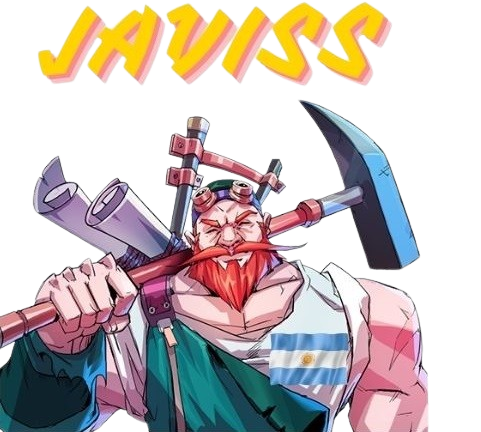
Conclusion
The Common cards in the Rebellion reward set offer a balanced mix of value and situational utility, though they’re less universally impactful than the Epic cards. Averaging around 4/10 overall, many of these Commons bring specific strengths without overwhelming power, making them more useful in particular contexts rather than as general standouts. Cards like Mar Toren Trader and Nimbledook Explorer shine as versatile low-mana options, providing essential support roles that can tilt a match in your favor, especially in niche rulesets.
On the other hand, some Commons, such as Tokatag Conscript and Chaos Evoker, struggle to find a strong place in the meta, offering limited synergy or impact. These cards may work in highly specific matchups, but are unlikely to become staples in most lineups. Still, there are unique aspects within this set—Immunity, Protect, and debuffs like Headwinds and Silence—that add tactical flexibility.
In summary, while Commons lack the raw power of higher rarities like Epics, they’re easy to collect and offer specialized tools that will prove helpful in certain battles. For newer players, these cards can quickly become reliable assets, and for experienced players, they add options for lower-mana or restricted-ruleset matches.
What are your thoughts on the Common Rebellion cards? Which ones have become your go-tos? Share your experiences below! 👇🔥
Also if you want to check out my latest post you can by clicking the images:
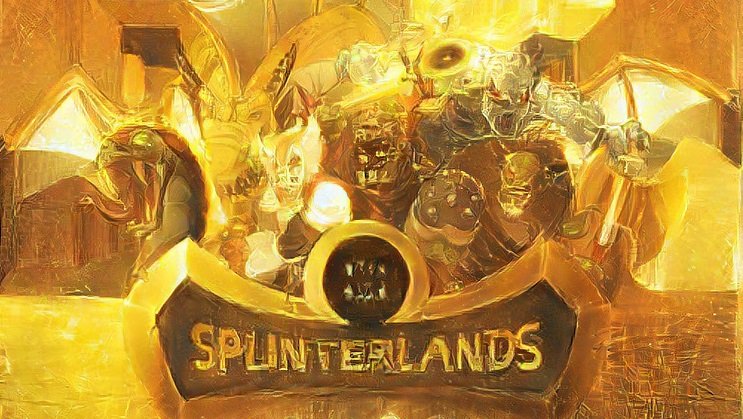
| SPLINTERLANDS.COM - Referral Link | SPLINTERSHARDS (SPS) | BLOG | DISCORD | TELEGRAM |
#splinterlands #play2earn #challenge

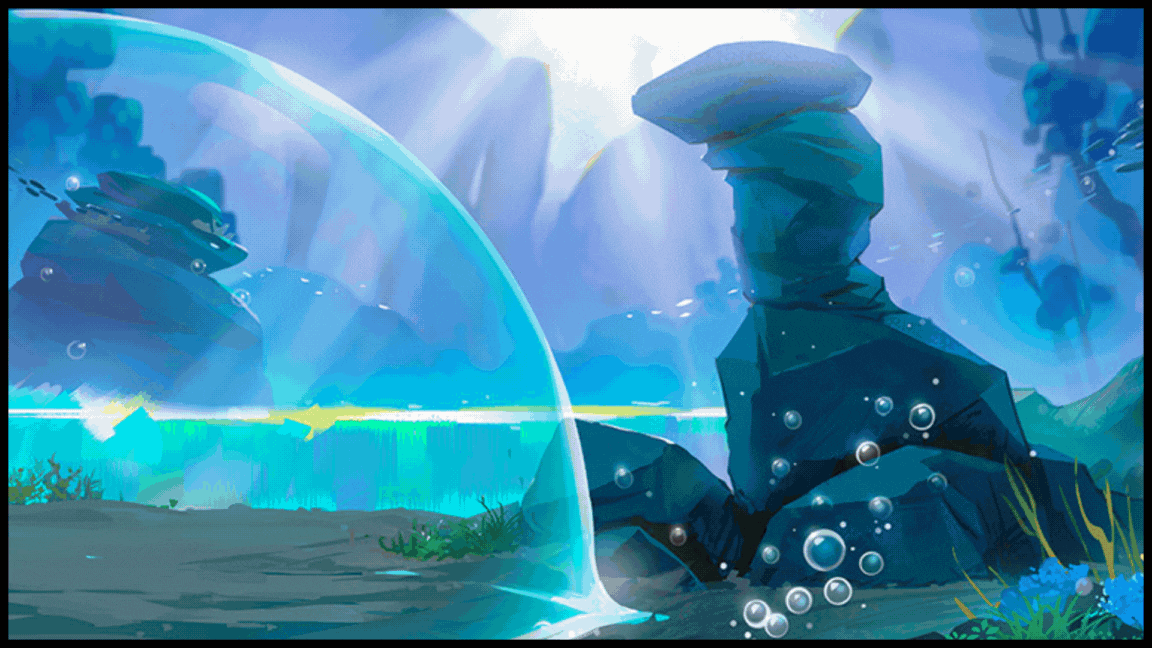

Thanks for sharing! - @clove71

thanks for the support!